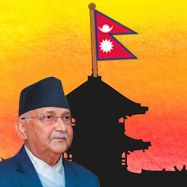Testing Times for Democracy in Nepal
The public faith in the constitution and political system in Nepal has eroded drastically in last one year. However, for now, all eyes are set on whether the Supreme Court would validate the President’s May 22 action.
- Nihar R. Nayak |
- June 17, 2021 |









